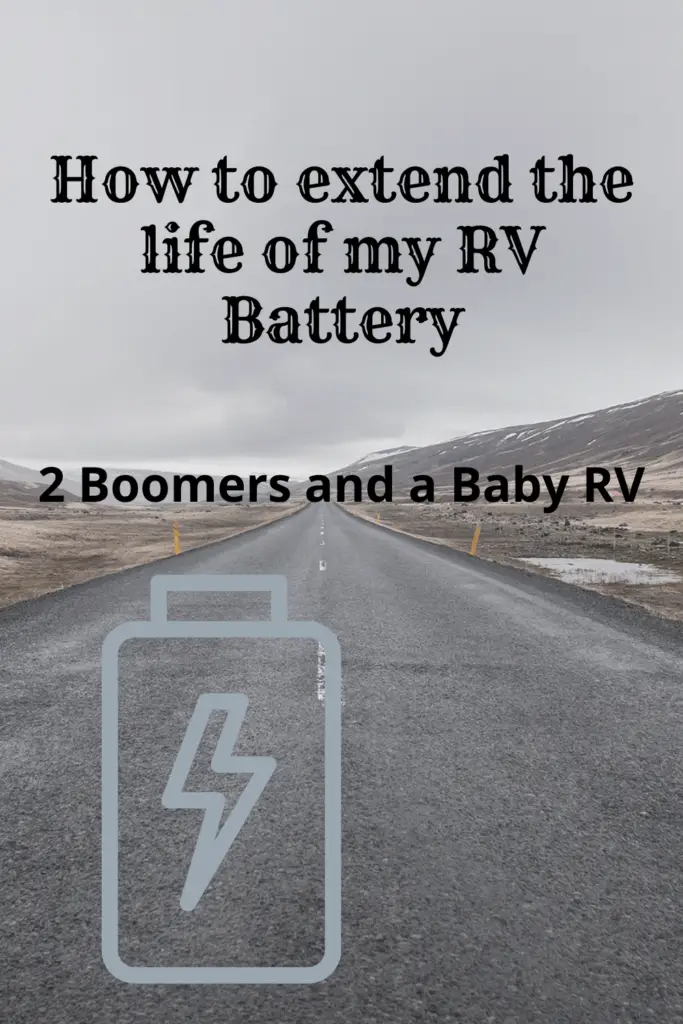RV batteries are costly, so most of us want to get as much life out of them as possible. I have had battery issues several times and it is quite a pain tracking down the source or at least it used to be. After trial and error, I have since been on the winning side of the battery game. So, you ask, why does my battery keep dying? Let’s do a little RV battery troubleshooting.
Why do my RV house batteries keep dying?
The most common reason you see RV house batteries dying is age. Other possible problems can stem from not being charged properly, taking on too much of a load repeatedly, improper storage when not in use, or lack of regular maintenance. Let’s start here with our RV battery troubleshooting and see if we can get to the bottom of your problem or you can also jump down to our frequently asked questions section for more answers.

How old is your battery?
Older batteries will lose their ability to hold a charge over time. Proper maintenance is the only way to extend its life and stop the headaches. 4-6 years is a good life expectancy for an RV battery that has been cared for. When it comes to RV battery troubleshooting, how it is being maintained is always the best place to start.
Are you properly charging your battery?
If you are overcharging or if it has extended time being undercharged this will also take its toll on the life expectancy. A properly maintained battery will not only perform better but be there for you when you need it.
What kind of load are you putting on your battery?
Some campers are just running more devices and using more amps than they think. If you have all the lights on or a fan or 2, this will swiftly drain a battery that is not connected to shore power. There are also some devices in your RV that could be pulling amps (small amounts) while not even in use.
Regular maintenance is the best practice for ensuring the longevity of your battery’s life. Never let your battery charge drop too low without recharging. Batteries dropping below 50% it is said to have a damaging effect on the battery’s ability to hold a charge.
In storage, you should pull the batteries, and store them in a warm place with a trickle charger hooked up. This should keep your batteries ready for the next season of outdoor adventures.
You may also need to learn more about your RV electrical system as a whole – Check out How does an RV electrical system work?
How to prevent a dead battery in my RV?
As we stated earlier best practice is regular maintenance to assure your battery is ready to go. To keep your battery in tip-top condition, keep fully charged whenever possible. Also, check water levels and add when needed (if applicable). RV batteries are more costly than the average car battery and you probably want them to last. Following this regular routine can make your batteries last longer and perform better. Tips to extend the life of my RV battery
Types of RV batteries
There a 3 commonly used batteries in an RV: Lithium, AGM (absorbent glass mat), and lead-acid batteries.
Our choice for RV use is the Lithium battery for its long life. The downside is limited cold-weather performance and upfront cost. The cost is really offset in the long run though because of its extended battery life. As long as it is properly maintained it will pay off spending a little extra.
Lithium Batteries
A lithium-ion battery is a type of rechargeable battery that is charged and discharged by lithium ions moving between the negative (anode) and positive (cathode) electrodes.
Because lithium-ion batteries are suitable for storing high-capacity power, they are used in a wide range of applications. Uses include RVs, consumer electronics such as smartphones and PCs, industrial robots, production equipment, and automobiles.
AGM Batteries
An Absorbed Glass Mat battery, or AGM battery, is filled with fiberglass matting. The matting is covered with an acid and electrolyte mixture, then packed between the plates of the battery. Because of this design, oxygen, and hydrogen combine and replace the water content of the battery. These batteries discharge slower and will last longer when stored. Also, You don’t need to equalize the battery or add distilled water to it. There’s no corrosion, so you don’t need to clean the battery terminals. Somewhat still pricy, but a good choice for the RV enthusiast.
Lead Acid Batteries
Being the least expensive of the 3, Lead-acid batteries are made up of individual cells that are connected internally in series. Each cell contains lead plates with a separator between them and is filled with an electrolyte made from a mixture of sulfuric acid and water. The batteries require occasional inspection of the cells to maintain proper water levels. This battery is not suggested for your RV due to maintenance and life expectancy. Less stress on the pocketbook upfront, but if not taken care of you may need to replace it every 2-3 years or even less.
Optima RV batteries – AGM
Look for the blue top

Installing an OPTIMA Blue Top high-performance AGM battery in your boat or RV means exceptional running time and more recharges than you’d get out of a traditional battery.
It’s the perfect marine battery for boats with trolling motors, and extensive electronic systems, and works well as an RV battery for RVs with creature comforts that tend to drain batteries quickly.
On top of providing outstanding vibration resistance, the Blue Top efficient power delivery and faster recharge time mean you’ll spend less time worrying about your battery.
This means more time for fun. Again and again. This flexible boat battery and RV battery are ideal for those who need a sure-starting, strong-cranking, maintenance-free power source.
- Up to three times more recharges than other marine batteries
- More than 15 times the vibration resistance
- Spill-proof, mountable in virtually any position
- Maintenance-free
- Works well as a boat battery or RV battery
How long does it take to charge a dead RV battery?
Charging can take as long as 8 hours depending on your charging device, car alternator, RV converter, or battery charger. This is especially true if you have drained your battery to too low of levels. There are some quick charging machines you can purchase to speed up this charging process, but it is best to not let it get to that point.
RV batteries are more costly than the average car battery, so they are something you want to last as long as possible.
10 RV battery tips for a longer life
Battery disconnect switch

Can you leave a trickle charger on all winter?
To prevent the need for some early spring RV battery troubleshooting, try this.
Usually, if you use the proper trickle charger with auto-shutoff capability. These chargers can be used continuously all winter long if needed. You still want to make occasional checks on your RV while in storage to assure nothing seems out of the ordinary.
Battery trickle charger

RV Battery Troubleshooting and Frequently Asked Questions
How long should RV batteries last?
A quality battery can last anywhere from 4 to 6 years with proper maintenance, There are people that swap them out every couple of years, but this is wasted money and unnecessary for a properly cared-for battery. I think I could find something better to spend my 300-500 dollars on than just replacing to replace.
How long will an RV's battery last when boondocking?
Depending on what you are using and for how long, 12V batteries can last as long as 2-3 days. This is really just minimal use such as charging phones, turning lights on and right back off after using, water pump or power Dometic refrigerator. The addition of solar panels for recharging or even adding another battery to the system can make a boondocking outing much more enjoyable.
Do RV batteries charge when plugged into shore power?
Yes, with the help of your converter your RV house battery will charge while it is plugged into shore power. 120V power source runs through your converter to produce a 12V power source that charges your house batteries, This 12V power is also used for lights, fans, and water pumps.
Does RV battery charge driving?
Yes, it will charge from the actual RV alternator or if you are running the generator. Your generator will run power through the converter we talked about earlier to convert 120V to 12V.
Should I disconnect my RV battery when Stored?
You should disconnect the battery when stored and keep it in a warm, dry place. It is also recommended that you use a battery tender to keep the battery from completely discharging. Furthermore, if connected to shore power you may want to disconnect the battery switch to keep from overcharging your batteries. As stated at the beginning of this article, overcharging or if it has extended time being undercharged, takes its toll on the life expectancy.
Conclusion
In the end, it is your money and you decide when and where maintenance is done. But with the cost of a new battery currently around 300-500 dollars for a quality product, it is worth your time. It is really just a matter of a few minutes to inspect and make sure it has a proper charge to give you peace of mind. The last thing you want is to be camping with the family and have your house batteries fail. That is a quick way to put a damper on what was once a fun outing.
An once of prevention is worth a pound of cure!





